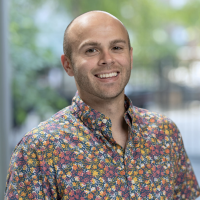
Computational & Systems Biology Program
The Caleb Lareau Lab
Research

Assistant Professor
The focus of the Lareau Lab is to understand how cells in our bodies adapt, expand, and evolve during the course of our lives, particularly in the immune system. The theme of our lab’s research is Computational and Translational Immunology, which is purposefully broad but grounds our research program in these tenets:
- Each of our studies develops or utilizes advanced computational methods to discern patterns from large datasets, typically generated from genomics sequencing.
- Inspired by the promise and demonstrated efficacy of immunotherapies, we focus our research to understand and manipulate properties of immune and hematopoietic cells.
- We ask questions with translational relevance in mind. These may be derived from a specific clinical observation or framed to study a biological principle that may underlie disease or response to therapy.
We are particularly interested in how somatic evolution—the collection of mutations, infections, and exposures to therapies that humans experience over a lifetime—reshapes fundamental cellular processes in the immune system.
To conduct our work, our group develops and applies computational methods and genomics-based technologies. We specialize in utilizing single-cell multi-omics approaches that profile multiple orthogonal properties of the same cells, including cell state (i.e. accessible chromatin, RNA, and protein) as well as cell lineage (i.e. somatic mtDNA and nuclear mutations). In addition to resolving the functional heterogeneity of immune cells throughout the body, we hope to help translate our basic observations into safer and more efficacious cancer immunotherapies.
Publications Highlights
C.A. Lareau+, et al. (2023) Latent human herpesvirus 6 is reactivated in CAR T cells. Nature. DOI: 10.1038/s41586-023-06704-2
C.A. Lareau+, et al. (2023) Single-cell multi-omics reveals dynamics of purifying selection of pathogenic mitochondrial DNA across human immune cells. Nature Genetics. DOI: 10.1038/s41588-023-01433-8.
C.A. Lareau+, et al. (2023) Mitochondrial single cell ATAC-seq for high-throughput multi-omic detection of mitochondrial genotypes and chromatin accessibility. Nature Protocols. DOI: 10.1038/s41596-022-00795-3.
A.M Tousley, M.C. Rotiroti, L Labanieh, L.W. Rysavy, W. Kim, C.A. Lareau, et al. (2023). Co-opting T cell proximal signaling molecules enables Boolean logic-gated CAR T cell control. Nature. DOI: 10.1038/s41586-023-05778-2.
C.A. Lareau+. (2023). Resolving subtle cell states in sparse single-cell data. Nature Biotechnology DOI:10.1038/s41587-023-01797-6.
People

Caleb Lareau, PhD
Assistant Professor
- The Lareau Lab synthesizes computational and experimental genomics methods to study how immune cells in our bodies adapt, expand, differentiate, and evolve over an individual’s lifetime.
- PhD, Harvard University; Cambridge, MA
- lareauc@mskcc.org
- Email Address
Members

Research Fellow

Research Fellow

Graduate Research Assistant

Sr. Research Technician

Administrative Assistant
Lab Affiliations
Achievements
- K99/R00 Pathway to Independence Award (2022-2027)
- Forbes 30 under 30 (2022)
- STAT Wunderkind (2022)
- Stanford Science Fellowship (2020-2023)
- NCI F31- Ruth L. Kirschstein National Research Service Award (2018-2020)
Read more
- National Science Foundation Graduate Research Fellowship (2015-2018)
- Barry M Goldwater Scholar (2013)
- University of Tulsa Presidential Scholar (2011-2015)
Open Positions
To learn more about available postdoctoral opportunities, please visit our Career Center
To learn more about compensation and benefits for postdoctoral researchers at MSK, please visit Resources for Postdocs
Graduate Students
We are actively recruiting graduate students with interests in computational biology, single-cell genomics, immunotherapy, and/or molecular genetics.
Postdoctoral Fellows
We are recruiting postdoctoral associates to help build the research environment in the lab. We are particularly interested in individuals with wet-bench backgrounds, including those that seek mentored training in computational biology, data science, genomics, and/or biotechnology.
Get in Touch
-
Lab Head Email
Disclosures
Doctors and faculty members often work with pharmaceutical, device, biotechnology, and life sciences companies, and other organizations outside of MSK, to find safe and effective cancer treatments, to improve patient care, and to educate the health care community.
MSK requires doctors and faculty members to report (“disclose”) the relationships and financial interests they have with external entities. As a commitment to transparency with our community, we make that information available to the public.
Caleb Lareau discloses the following relationships and financial interests:
-
Cartography Biosciences
Equity; Professional Services and Activities
The information published here is a complement to other publicly reported data and is for a specific annual disclosure period. There may be differences between information on this and other public sites as a result of different reporting periods and/or the various ways relationships and financial interests are categorized by organizations that publish such data.
This page and data include information for a specific MSK annual disclosure period (January 1, 2023 through disclosure submission in spring 2024). This data reflects interests that may or may not still exist. This data is updated annually.
Learn more about MSK’s COI policies here. For questions regarding MSK’s COI-related policies and procedures, email MSK’s Compliance Office at ecoi@mskcc.org.